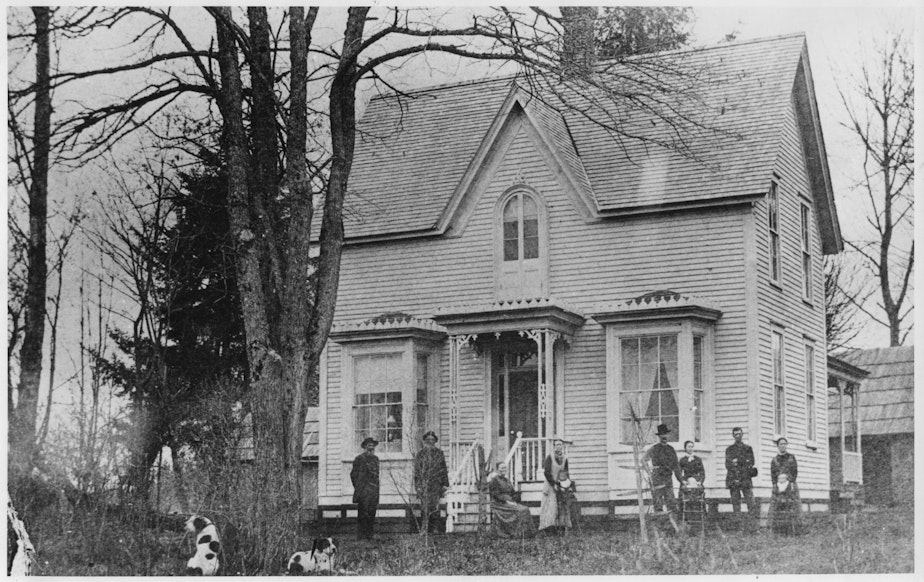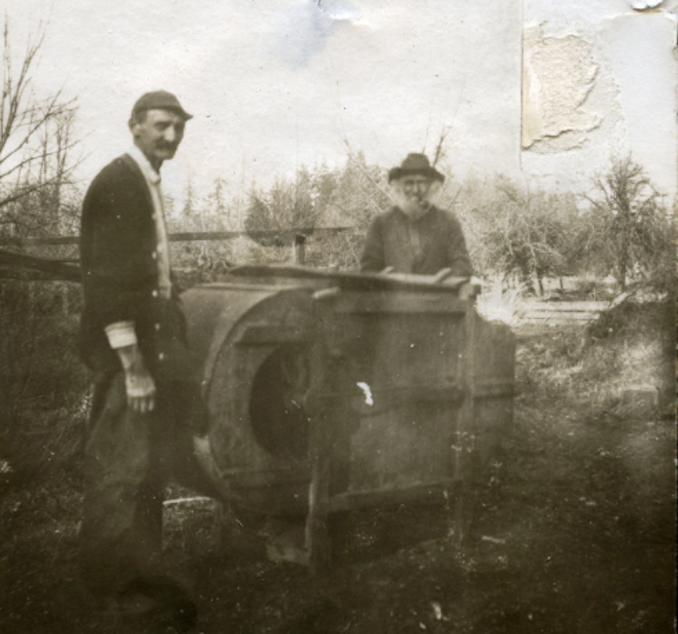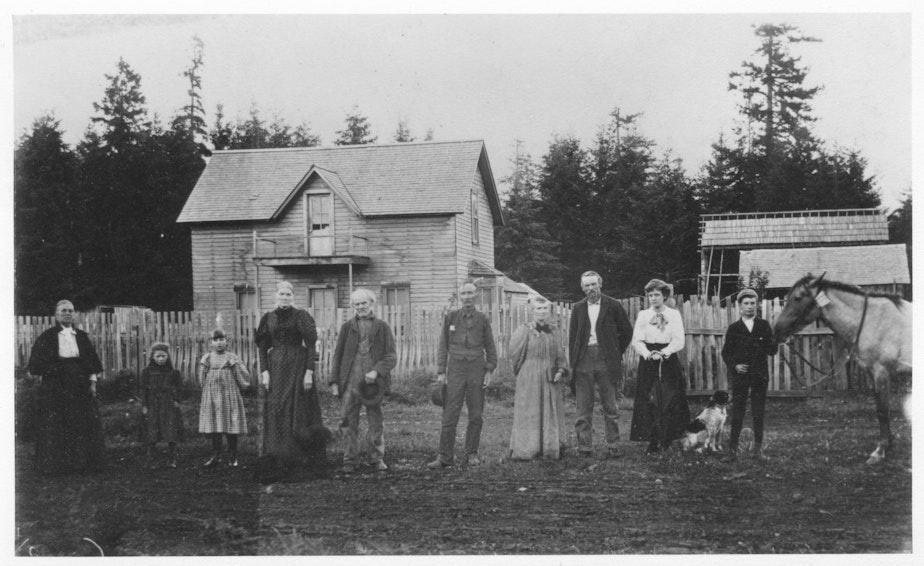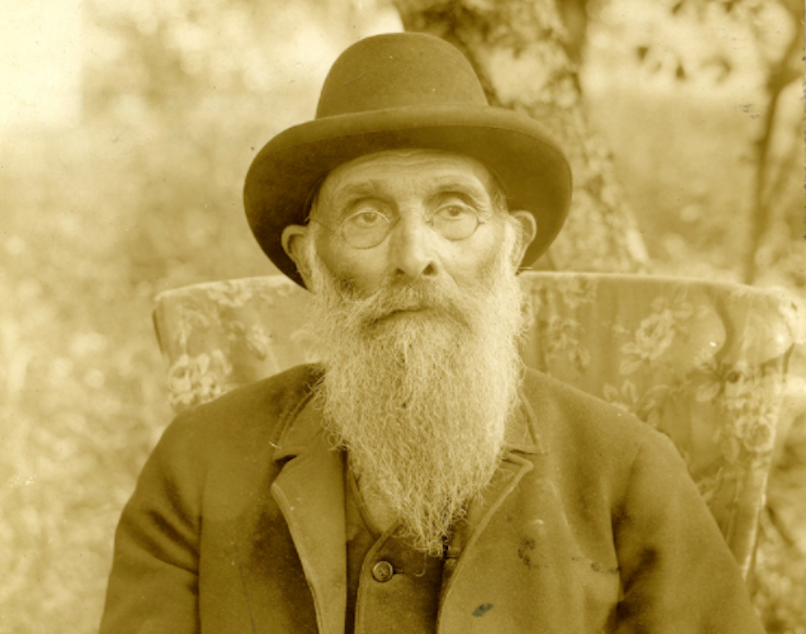George Bush: The Black pioneer who founded Tumwater

Let's talk about George Bush.
Not of the presidential ilk, but the one who founded Tumwater, Wash. in the 1800s.
Tumwater was the first major American settlement in the Puget Sound region, and the territory that would become Washington. And it was founded by George Bush, who was African-American.
"It's not the most publicized story," said Don Trosper, Public History Manager with the Olympia Tumwater Foundation.
“We are the first settlement, but a big factor of it was the racism in Oregon that forced them north to the British side (of the Columbia River)," he said. "Because of that, we were able to settle Puget Sound and a big influence on what would become Washington state.”
Trosper's family roots go back to the late 1800s. A road in town is named after his great grandfather. In fact, his distant uncle, by marriage was part of the wagon party that Bush led on the Oregon Trail.
George Bush, the pioneer
Bush was of Irish-African descent and born in the late 1700s in Pennsylvania. He became a successful free man decades before the Civil War ended slavery in the United States.
In his early life, he worked as a fur trapper and soldier. He fought in the war of 1812, before making a considerable living as a cattle rancher in Missouri. That's where he met his wife Isabella, a German-American woman. Though, being a free person of color in a state where slavery was legal, and his children also being of mixed race, he often found that communities were not always welcoming to him.
“They were sensing the early pre-Civil War Missouri racism that was cropping up more and more," Trosper said. "So they were looking out to the Wild West to escape racism by going out on the Oregon Trail."

With the allure of free land out in Oregon, he teamed up with his friends, the Simmons family. Bush was already a successful rancher, and he sold much of what he owned. He was then able to finance much of the trip and purchased Conestoga wagons for the trail.
“The folklore says they helped the poor members of the party to help them pay for the cost of wagons for their trip … there are a lot of legends, and we can’t confirm it, but they say he kept gold in the (false) bottom of his wagon.”
The party set out in 1844. It was an eight-month trip. They arrived at The Dalles, Oregon along the Columbia River. At the time, the Oregon territory spanned the Northwest. It was under U.S. control south of the river, and under the joint purview of the British (Hudson Bay Company) and the Americans north of the river. The party sent out a scout into the Willamette Valley to seek information about region and to gather supplies.
“And the word that came back is that they hadn't escaped racism at all, because the Americans on the American side of the river made an ordinance that any people of color who tried to settle there would get periodic whippings."
Oregon implemented a "lash law" for people of color who remained in the territory. It is not believed that anyone was ever whipped as a result, and the law was quickly repealed. But the message was clear: "Get out or face violence."
"They were in a quandary, whether they’d go south to protection of the Mexican government, or the north side, the British side of the river," Trosper said.
They opted to head north where the Simmons-Bush party found a spot just south of Puget Sound, where Olympia is today. They founded a community that grew to be a major hub for the region's travelers and traders. The Bush family established a farm near the Deschutes River. Much of that farmland is the Olympia Airport today.
Bush also financed a sawmill and a gristmill, and started a hotel that was open to everyone. The settlement was the first sign of civilization for travelers on the Cowlitz Trail heading north from Oregon.
“The farm was very successful right from the beginning,” Trosper said. “(Travelers) would be given tools and feed and advice. He would say ‘Pay me back when your crops come in, whenever that is.’ They gained a real following from those early settlers; a lot of loyalty.”

Bush was renowned for his generosity. One story that has been told through the generations is of a man who was travelling alone by horseback. He arrived at the Bush farm while en route to Olympia. The Bush family made him a meal and hosted him.
The man attempted to pay them for their kindness, but Bush never accepted payment for good deeds. The man explained that he was Isaac Stevens, the first governor of the new Washington territory. But Bush still wouldn't accept compensation (Stevens reportedly hid a gold coin under his plate before he left).
As Washington eventually started to take shape, more exclusionary laws emerged, banning people of color from owning land. But Bush's reputation was so favorable, the territory's early lawmakers petitioned Congress to make an exception for him. Congress passed a special act, and Bush was allowed to own the land he farmed. The exclusionary laws remained on the books for everyone else, however.

Tumwater remained a beacon for travelers. Evidence of that is in its name. "Tumwater" is derived from Chinook Jargon, a trading language that incorporates Indigenous, English, and French dialects.
Signs of Bush's influence remain to this day. He planted a butternut tree on his farm that was the oldest living of its kind in the U.S. before it died in 2021 of natural causes. A seedling from that tree was planted on the state Capitol grounds in Olympia in 2009 and was dedicated to Dr. Martin Luther King Jr. Other butternut seedlings were planted in a park in Tumwater, at Washington State University, and at Bush Middle School that is named in his honor.
Bush and his wife Isabella had six boys who lived with them on the farm. Five were born in Missouri. The sixth was born in Washington in 1847 and named Lewis Nisqually. Another son, William Bush, became a state lawmaker, and introduced the bill that established Washington State University.
'Black History of the Northwest' is a collection of web articles that illuminates the lives and history of Black people in the Pacific Northwest.




